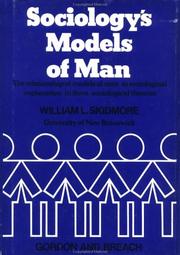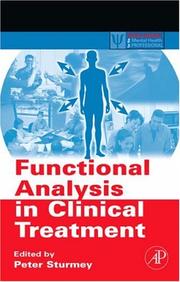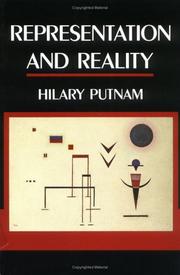| Listing 1 - 6 of 6 |
Sort by
|
Book
ISBN: 0262060795 Year: 1981 Publisher: Cambridge, Mass. : MIT Press,
Abstract | Keywords | Export | Availability | Bookmark
 Loading...
Loading...Choose an application
- Reference Manager
- EndNote
- RefWorks (Direct export to RefWorks)
Cognitive science --- Functionalism (Psychology) --- Philosophy and cognitive science --- Psychology --- Reductionism --- Sciences cognitives --- Philosophie et sciences cognitives --- Psychologie --- Réductionnisme --- Philosophy --- Philosophie --- Philosophy of mind --- Mind, Philosophy of --- Mind, Theory of --- Theory of mind --- Metaphysics --- Philosophical anthropology --- Science --- Cognitive science and philosophy --- Functional psychology --- Réductionnisme

ISBN: 0677047800 9780677047805 Year: 1975 Publisher: New York (N.Y.): Gordon and Breach,
Abstract | Keywords | Export | Availability | Bookmark
 Loading...
Loading...Choose an application
- Reference Manager
- EndNote
- RefWorks (Direct export to RefWorks)
Mead, George H. --- Parsons, Talcott --- Homans, George C. --- Social exchange --- Functionalism (Psychology) --- Symbolic interactionism --- Exchange theory (Sociology) --- Symbolic interactionism. --- #SBIB:316.22H30 --- #SBIB:316.22H20 --- Interaction, Symbolic --- Interactionism, Symbolic --- Symbolic interaction --- Symbolic-interactionist theory --- Qualitative research --- Social psychology --- Interpersonal relations --- Social interaction --- Functional psychology --- Psychology --- Sociology --- Opvattingen omtrent het dialectiek-begrip in de sociologie --- Maatschappijopvattingen en sociologische denkrichtingen --- Methodology --- Social exchange. --- Exchange theory (Sociology). --- Functionalism (Psychology).

ISBN: 128096278X 9786610962785 0080471099 0123725445 0128134291 9780123725448 9780080471099 9780128134290 9780128054697 0128054697 Year: 2007 Publisher: Amsterdam Boston Academic Press
Abstract | Keywords | Export | Availability | Bookmark
 Loading...
Loading...Choose an application
- Reference Manager
- EndNote
- RefWorks (Direct export to RefWorks)
"Much of clinical psychology relies upon cognitive behavior therapy to treat clinical disorders via attempting to change thinking and feeling in order to change behavior. Functional approaches differ in that they focus on context and the environmental influence on behavior, thoughts, and feelings. This second edition of Functional Analysis in Clinical Treatment updates the material in keeping with DSM-5 and ICD-10 and provides 40% new information, including updated literature reviews, greater detail in the functional analysis/assessment sections of each chapter, two new chapters on autism spectrum disorders and chronic health problems, and examples of worked assessments, such as interview transcripts, ABC charts, and observational data"--
Clinical psychology --- Functionalism (Psychology) --- Psychopathologie. --- Behandelingsmethoden. --- Methodology. --- Functional psychology --- Psychology --- Psychiatry --- Psychology, Applied --- Psychological tests --- Psychopathology. --- Methods of treatment. --- Psychology, Clinical --- Mental illness --- Psychology, Pathological --- therapy. --- Abnormal psychology --- Diseases, Mental --- Mental diseases --- Mental disorders --- Pathological psychology --- Psychology, Abnormal --- Psychopathology --- Neurology --- Brain --- Criminal psychology --- Mental health --- Psychoanalysis --- Madness --- Disabilities --- Diseases --- Clinical psychology. --- Mental Disorders --- Clinical Psychology --- Psychotherapy --- Clinical health psychology --- Health psychology --- Health psychology, Clinical --- Psychology, Clinical health --- Psychology, Health --- Salutogenesis --- Medicine and psychology

ISBN: 0262026236 9780262026239 0262528185 9786612099045 0262269511 1282099043 1435603141 0262261979 9780262269513 9781435603141 9780262261975 9781282099043 6612099046 Year: 2008 Publisher: Cambridge, Mass.
Abstract | Keywords | Export | Availability | Bookmark
 Loading...
Loading...Choose an application
- Reference Manager
- EndNote
- RefWorks (Direct export to RefWorks)
The first systematic examination of Hilary Putnam's arguments against computational functionalism challenges each of Putnam's main arguments.
Cognitive psychology --- Putnam, Hilary --- Gödel, Kurt --- Computers. --- Functionalism (Psychology) --- Mind-brain identity theory. --- Realism. --- Gödel, Kurt. --- Putnam, Hilary. --- Functionalism (Psychology). --- Gödel, Kurt. --- Automatic computers --- Automatic data processors --- Computer hardware --- Computing machines (Computers) --- Electronic brains --- Electronic calculating-machines --- Electronic computers --- Hardware, Computer --- Brain-mind identity theory --- Functional psychology --- Gkentel, Kourt --- גדל --- Computer systems --- Cybernetics --- Machine theory --- Calculators --- Cyberspace --- Brain --- Mind and body --- Psychology --- Empiricism --- Philosophy --- Universals (Philosophy) --- Conceptualism --- Dualism --- Idealism --- Materialism --- Nominalism --- Positivism --- Rationalism --- Computers --- Mind-brain identity theory --- Realism --- PHILOSOPHY/General --- COGNITIVE SCIENCES/General --- Godel, Kurt.

ISBN: 0262660741 0262161087 026228197X 0585021228 9780585021225 9780262161084 9780262281973 9780262660747 Year: 1988 Publisher: Cambridge, Mass. MIT Press
Abstract | Keywords | Export | Availability | Bookmark
 Loading...
Loading...Choose an application
- Reference Manager
- EndNote
- RefWorks (Direct export to RefWorks)
Hilary Putnam, who may have been the first philosopher to advance the notion that the computer is an apt model for the mind, takes a radically new view of his own theory of functionalism in this book. Putnam argues that in fact the computational analogy cannot answer the important questions about the nature of such mental states as belief, reasoning, rationality, and knowledge that lie at the heart of the philosophy of mind.
Theory of knowledge --- Realism. --- Mind-brain identity theory. --- Functionalism (Psychology) --- Truth. --- Reference (Philosophy) --- Mathematics --- Computers. --- Philosophy. --- Functionalism (Psychology). --- Reference (Philosophy). --- Computers --- Mind-brain identity theory --- Realism --- Truth --- Conviction --- Belief and doubt --- Philosophy --- Skepticism --- Certainty --- Necessity (Philosophy) --- Pragmatism --- Referring, Theory of --- Theory of referring --- Empiricism --- Universals (Philosophy) --- Conceptualism --- Dualism --- Idealism --- Materialism --- Nominalism --- Positivism --- Rationalism --- Brain-mind identity theory --- Brain --- Mind and body --- Functional psychology --- Psychology --- Automatic computers --- Automatic data processors --- Computer hardware --- Computing machines (Computers) --- Electronic brains --- Electronic calculating-machines --- Electronic computers --- Hardware, Computer --- Computer systems --- Cybernetics --- Machine theory --- Calculators --- Cyberspace --- Logic of mathematics --- Mathematics, Logic of --- Philosophy & Religion --- Math --- Science --- COGNITIVE SCIENCES/General --- PHILOSOPHY/Philosophy of Mind/General --- Mathematics - Philosophy.

ISBN: 0585042942 9780585042947 0791428850 0791428869 1438405766 Year: 1996 Publisher: Albany State University of New York Press
Abstract | Keywords | Export | Availability | Bookmark
 Loading...
Loading...Choose an application
- Reference Manager
- EndNote
- RefWorks (Direct export to RefWorks)
How to Build a Theory in Cognitive Science specifies the characteristics of fruitful interdisciplinary theories in cognitive science and shows how they differ from the successful theories in the individual disciplines composing the cognitive sciences. It articulates a method for integrating the various disciplines successfully so that unified, truly interdisciplinary theories are possible. This book makes three contributions of utmost importance. First, it provides a long-overdue, systematic examination of the field of cognitive science itself. Second, it provides a template for linking domains without loss of autonomy. This philosophical treatment of integration serves as a blueprint for future endeavors. Third, the book provides a solid theoretical foundation that will prevent future missteps and enhance collaboration.
Philosophy of mind. --- Philosophy and cognitive science. --- Functionalism (Psychology) --- Reductionism. --- Cognitive science --- Cognitive Science. --- Philosophy. --- Mental Processes. --- Philosophy of mind --- Philosophy and cognitive science --- Reductionism --- Psychology --- Humanities --- Psychological Phenomena and Processes --- Psychiatry and Psychology --- Behavioral Sciences --- Behavioral Disciplines and Activities --- Philosophy --- Cognitive Science --- Mental Processes --- Philosophy & Religion --- Speculative Philosophy --- Proxemics --- Behavioral Science --- Proxemic --- Science, Behavioral --- Sciences, Behavioral --- Psychologic Processes --- Psychologic Processes and Principles --- Psychological Processes --- Phenomena, Psychological --- Processes, Psychologic --- Processes, Psychological --- Psychological Phenomenas --- Psychological Processe --- Factors, Psychological --- Psychological Factors --- Psychological Side Effects --- Psychologists --- Psychosocial Factors --- Side Effects, Psychological --- Factor, Psychological --- Factor, Psychosocial --- Factors, Psychosocial --- Psychological Factor --- Psychological Side Effect --- Psychologist --- Psychosocial Factor --- Side Effect, Psychological --- Science --- Cognitive science and philosophy --- Mind, Philosophy of --- Mind, Theory of --- Theory of mind --- Metaphysics --- Philosophical anthropology --- Human Information Processing --- Information Processing, Human --- Pharmacy Philosophy --- Philosophical Overview --- Hedonism --- Stoicism --- Overview, Philosophical --- Overviews, Philosophical --- Pharmacy Philosophies --- Philosophical Overviews --- Philosophies --- Philosophies, Pharmacy --- Philosophy, Pharmacy --- Cognitive Sciences --- Science, Cognitive --- Sciences, Cognitive --- Functional psychology --- Psychological Phenomena --- Psychiatry --- Cognitive science. --- Psychology. --- Humanities. --- Psychological Phenomena. --- Psychiatry. --- Behavioral Sciences. --- Behavioral Disciplines and Activities.
| Listing 1 - 6 of 6 |
Sort by
|

 Search
Search Feedback
Feedback About UniCat
About UniCat  Help
Help News
News